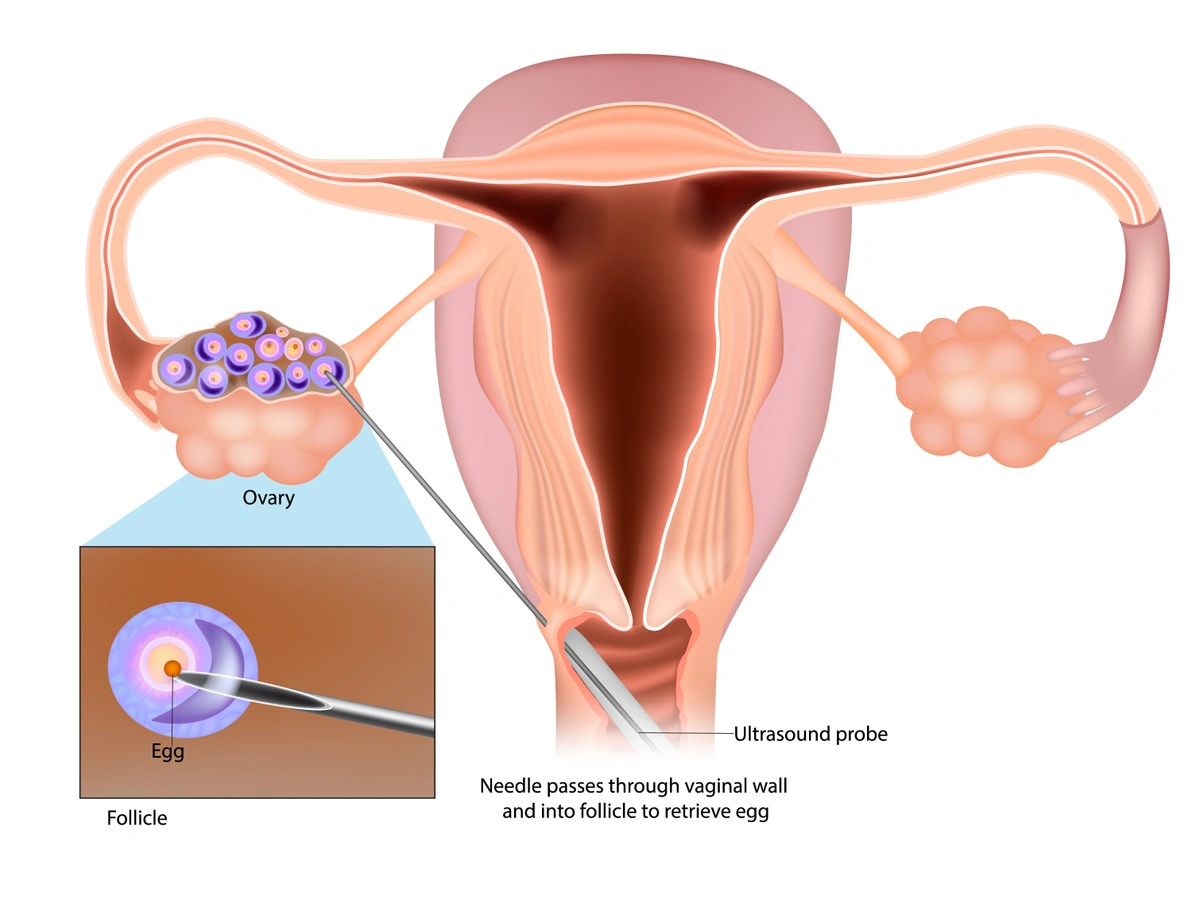
Egg Retrieval for Egg Freezing or In Vitro Fertilization (IVF)
Egg retrieval is a critical step in both egg freezing and in vitro fertilization (IVF), whether you are preserving fertility for the future or actively trying to conceive.
What Is Egg Retrieval?
Egg retrieval is a minimally invasive procedure where eggs are collected from the ovaries using ultrasound guidance and a thin needle. This is done under moderate intravenous sedation and typically takes 15-30 minutes. The eggs are then either frozen for future use or fertilized immediately in the lab to create embryos.
Illustration of an egg retrieval procedure
Why Are You Having an Egg Retrieval Procedure?
For Egg Freezing (Oocyte Cryopreservation):
The goal is to collect eggs to freeze and preserve your fertility for later. These eggs are not fertilized right away. You might consider egg freezing if you want to delay pregnancy for personal reasons (elective), or for medical reasons (such as before cancer treatment).
For Embryo Creation in In Vitro fertilization (IVF):
Egg retrieval is part of an IVF treatment cycle where the eggs are fertilized immediately after collection using sperm from your partner or a donor. The resulting embryos are then later transferred to your uterus to create a pregnancy.
What is the Egg Retrieval Process Like?
1. Ovarian Stimulation
Both egg freezing and IVF require stimulating your ovaries with hormones to produce multiple mature eggs. The protocols for stimulation are similar.
2. Timing and Scheduling
Whether it is for egg freezing or IVF, precise timing of egg retrieval must be followed to maximize the number of mature eggs retrieved. After ovarian stimulation with fertility medications by injection, lasting 7-10 days, when egg maturity is suggested by follicular size and hormone levels, a trigger shot is given to cause final egg maturation. Egg retrieval is typically performed 35 hours after the trigger shot.
3. Post-Retrieval Steps
-
Egg Freezing: Eggs are rapidly frozen (vitrified) several hours after retrieval. They remain frozen in storage until you decide to thaw and use them for conception using sperm in IVF.
-
IVF: Eggs are immediately fertilized in the lab. The embryologists monitor embryo development before selecting the best ones for transfer or freezing.
Risks and Side Effects
Egg retrieval is generally safe but carries some similar risks whether you’re freezing eggs or doing IVF, including:
-
Cramping or bloating from ovarian stimulation
-
Discomfort from the retrieval procedure
-
Rarely, ovarian hyperstimulation syndrome (OHSS), where ovaries become swollen and painful and may require special care
-
Small risks related to anesthesia, bleeding, infection, or injury to tissue adjacent to the ovaries
Your fertility team monitors you closely to minimize risks.
How Many Eggs Should You Expect to Retrieve?
The number of eggs retrieved varies widely depending on your age, ovarian reserve, and response to stimulation:
-
Younger women tend to produce more eggs per cycle.
-
On average, 5-25 eggs may be retrieved.
-
For egg freezing, more eggs typically mean better odds of future pregnancy.
-
In IVF, the quality and fertilization potential of eggs are crucial.
What Happens After Egg Retrieval?
-
Egg Freezing: Eggs are stored safely in liquid nitrogen at one of our embryology labs. When you’re ready to use them, they are thawed, fertilized, and transferred as embryos.
-
IVF: Embryos are monitored for several days before transferring to the uterus or being frozen for storage.
Should You Consider Egg Freezing or IVF?
Egg freezing is ideal if you want to preserve fertility without immediate pregnancy plans or if you are planning to undergo medical treatments that may affect your fertility. IVF is the treatment choice if you’re ready to conceive now or soon. It can also address many fertility challenges, such as ovulatory disorders, tubal issues, male factor infertility, unexplained infertility, and more.
Final Thoughts
Egg retrieval is a cornerstone of both egg freezing and IVF. Working closely with your fertility specialist helps tailor the process to your unique situation and maximizes your chances for success, whether you’re preserving fertility or actively trying to conceive.
If you’re considering either option, reach out to schedule a consultation. We’ll guide you through every step with personalized care and expert advice.
Categories
About the AFCC Blog
Welcome to the Advanced Fertility Center of Chicago’s blog! Here, you will find information on the latest advancements in fertility care and treatments, including IVF, IUI, third-party reproduction, LGBTQ+ family building, preimplantation genetic testing, and more. Since 1997, we’ve used our experience and continuous investment in the latest fertility technology to help thousands of patients grow their families. Contact us today for more information or to schedule a new patient appointment.


